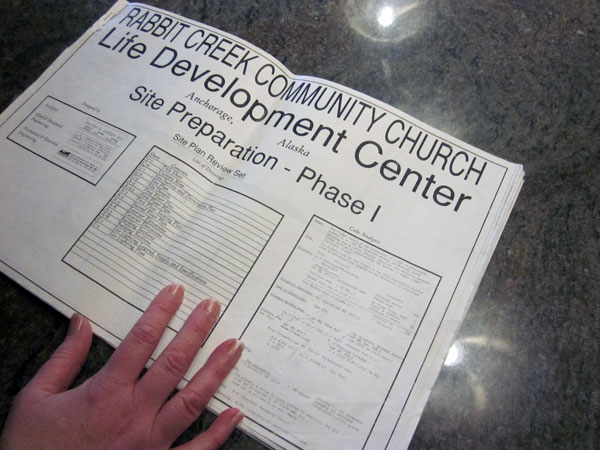
A group of home owners in the Rabbit Creek neighborhood are concerned that non-residential development could drain their water supply. They say it could happen in many neighborhoods on the Hillside and are suggesting an amendment to Title 21, Anchorage land-use law as a preventative measure. Members of the Anchorage Assembly are in the final stages of a 10-year review of Title 21, which has been in the news for addressing issues like sidewalks, landscaping and stream setbacks. But the Rabbit Creek residents say, if it goes through without addressing water issues, the municipality could face problems down the road.
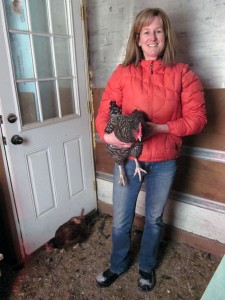
Beth Glottfelty, her husband and three kids moved to the Rabbit Creek area in 2005, largely because they believed it was the perfect place to raise kids and chickens.
The chickens live in a refurbished conex container beside Glottfelty’s 1952 homesteader log cabin on the lower hillside. There’s lots of open space. On a clear day she can see all the way across Turnagain Arm to Hope.
“We love living in this area because of the rural aspect. We are on large lots, 2.5 acres in general. And we have a wonderful view and wonderful neighbors and it’s very remote yet close to Anchorage for all the amenities that Anchorage provides,” Glottfelty said.
In December of 2011, just before Christmas, something happened that got her concerned about her water.
“I was home with my kids. They were on Christmas break. And I went to turn on the faucet in the morning to get things ready for breakfast and air came out of the faucet,” Glottfelty said.
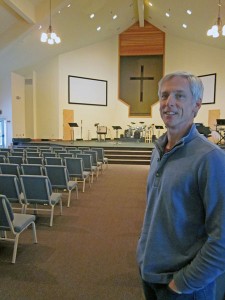
The water started flowing normally again after a few days. But after asking around the neighborhood, Glottfelty found out that many of her neighbors, connected to the same aquifer as a nearby church well had similar problems that day – in all, six wells were drained, she says, and one went permanently dry.
“That is when we banded together as a neighborhood to figure out what exactly had happened. And the more we found out the more frightened we got and the more we needed to probe and prod and request protection from the city,” she said.
The church ran a ‘drawdown’ water test that day in December because they were planning an expansion. They ran the water at 5 gallons a minute for 24 hours. The church has since dropped the idea of expanding. But as a result of their experience, Glottfelty and her neighbors have requested an amendment to Anchorage’s title 21 land-use law, protecting residential neighborhoods from large non-residential establishments that could harm their water supply.
Dane Havard is a Pastor at Rabbit Creek Community Church. Havard says they have tried to expand three times since 2004. Each time the neighbors appealed their applications to build. He admits, he also is concerned about the Hillside’s water supply – and not just for non-residential development.
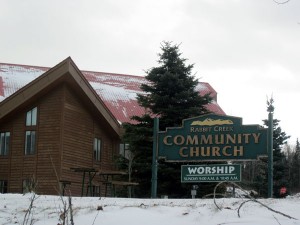
“I do understand what their question is about. I don’t think it’s really about a particular type of use. I think the claim was that the kind of use that we had in mind would somehow have had a greater impact than residential use. And if the city or the state continues to allow residential development, the same issues are there,” Havard said.
Nancy Pease with the Rabbit Creek Community Council says that is a real concern.
“It’s anecdotal, but we do hear about people who have had to drill a second well. Or, in the case of my next door neighbor, had to use some sort of hydro fracking to enlarge the little seems that feed his well which is in bedrock. And I believe there is at least one subdivision, the Southpark subdivision, and they tapped into the city water supply when their community well wasn’t adequate,” Pease said.
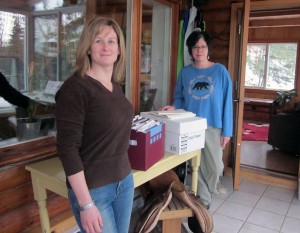
Pease says the Hillside has some of the largest tracks of undeveloped land in the municipality, yet there has not been much mapping of the aquifers. And there are places where the water table is very low or is accessed through only through small seems in the bedrock, she says. Pease worries that could spell trouble without some protections for residents in Anchorage land-use law.
“And in these areas, there may not be enough water to build out to the full density that it’s zoned for. And their certainly may not be enough water to support more intensive uses such as school’s or group living or churches the kinds of uses that take a lot more water, at least periodically than a single residential home,” Pease said.
But Assembly member Debbie Ossiander, who chairs the Title 21 committee says the amendment is unlikely be included. She says she forwarded the request for an amendment to a municipal board that handles water and waste water issues but they have not gotten back to her. She wants the board to send her wording for the new code.
The final deadline for all comments and suggested amendments to Title 21 to be turned in to the Assembly is Tuesday, February 12. The Assembly will take their final vote on Title 21 Feb. 26.
Listen to the full story
Daysha Eaton is a contributor with the Alaska Public Radio Network.
Daysha Eaton holds a B.A. from Evergreen State College, and a M.A. from the University of Southern California. Daysha got her start in radio at Seattle public radio stations, KPLU and KUOW. Before coming to KBBI, she was the News Director at KYUK in Bethel. She has also worked as the Southcentral Reporter for KSKA in Anchorage.
Daysha's work has appeared on NPR's "Morning Edition" and "All Things Considered", PRI's "The World" and "National Native News". She's happy to take assignments, and to get news tips, which are best sent via email.
Daysha became a journalist because she believes in the power of storytelling. Stories connect us and they help us make sense of our world. They shed light on injustice and they comfort us in troubled times. She got into public broadcasting because it seems to fulfill the intention of the 4th Estate and to most effectively apply the freedom of the press granted to us through the Constitution. She feels that public radio has a special way of moving people emotionally through sound, taking them to remote places, introducing them to people they would not otherwise meet and compelling them to think about issues they might ordinarily overlook.



